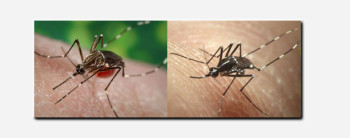A mosquito-borne disease that causes fever and severe joint pain has arrived in Georgia.
The Georgia Department of Public Health on Thursday confirmed the state’s first human case of chikungunya this year. The patient was infected during a recent trip to a Caribbean nation, state officials said.
The state did not identify the name or location of the patient due to privacy concerns.
It’s not the first Georgia case of chikungunya, which is spread through mosquito bites. But it’s the first associated with a widespread Caribbean outbreak that began in December, said Cherie Drenzek, the state epidemiologist for Public Health.
Chikungunya disease does not often result in death, but its symptoms can be severe and disabling, officials said.
The CDC has reported more than 60 confirmed cases of chikungunya in the United States so far, and that number is growing.
“We and every other state expect more cases,’’ Drenzek said.
She added that the patient infected “is not severely ill and is doing well.”
The person was one of 12 Georgians tested for the virus recently by the CDC, Drenzek said. There have been others in the state infected in previous years, but she said these cases have been very rare here.
Travelers who go to islands in the Caribbean are at risk of getting chikungunya, health officials said. In addition, travelers to Africa, Asia, and islands in the Indian Ocean and Western Pacific are at risk, as the virus is present in many of these areas.
The most common symptoms are fever and severe joint pain, especially in the hands and feet. Other symptoms may include headache, muscle pain, joint swelling or rash.
Symptoms usually begin three to seven days after being bitten by an infected mosquito, with most patients feeling better within a week. Joint pain, though, can persist for months.
“It is extremely important that patients who are infected with chikungunya virus keep guard against additional mosquito bites,” Drenzek said.
“During the first week or so of infection, chikungunya virus can be passed from an infected person to another mosquito through mosquito bites. An infected mosquito can then transmit the virus to other people, though this has not yet happened in the U.S.”
Public Health noted that while the state has not seen local transmission of chikungunya, Georgia commonly has other mosquito-borne diseases such as West Nile virus or equine encephalitis.
Officials reminded people to protect themselves from mosquito-borne diseases by avoiding or limiting outside activity during times when the insects bite. (Mosquitoes carrying West Nile Virus usually bite at dusk and dawn, while mosquitoes carrying chikungunya virus bite during the day.)
Other protection measures include:
* Wearing loose-fitting, long-sleeved shirts and pants to reduce the amount of exposed skin
* Covering exposed skin with an insect repellent containing DEET.
* Emptying containers holding standing water, because they can be excellent breeding grounds for virus-carrying mosquitoes.
* Making sure doors and windows are in good repair and fit tightly, and fixing torn or damaged screens to keep mosquitoes outside.
For more information about chikungunya, here’s a CDC link:

